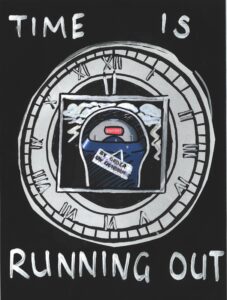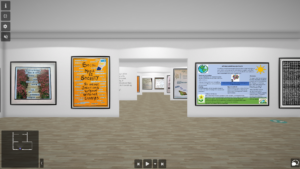The last three years of the Suicide in/as Politics project has flown by, but the end is now (scarily!) in sight and so as a team we have been thinking about how to communicate what we have found across the project and how to share the beautiful art and poetry that participants in our research donated to the project.

Mid-November brought with it a fantastic opportunity to do this, through the ESRC’s Festival of Social Sciences, where we held an event: ‘Is Suicide Prevention Everyone’s Business?’. Despite the horrible weather, the event was really well attended by policy makers, practitioners, researchers and members of the public – thanks so much to everyone who came!! The event combined a talk outlining the findings of the arts-based workshops which we ran as part of the project (for more info click here); an exhibition of art and poetry; and a hands-on workshop to facilitate attendees getting creative themselves! As part of this we created two zines, one more broadly on the politics of suicide prevention (Zine Suicide Prevention), and one specifically looking at LGBTQ+ suicide prevention (LGBTQ+ Suicide Prevention Zine, as well as sharing the poetry book (Poem booklet) we created earlier in the year for our Policy and Practitioner event at the University of Lincoln (for more information see here).
Our zines cover some core themes from our findings: firstly, participants resisted the idea of suicide as a purely ‘pathological’ (medical) problem. This was because participants felt it did not take into account the ways in which the roots of distress can be found in the socio-economic and political conditions in which lives are lived. Secondly, participants were positive about the kinds of suicide prevention that are provided in mental health settings. However, they also suggested policy makers’ and politicians encouragements for suicidal people to share their suicidal feelings could be problematic if the government did not also ensure that there were sufficient services available to listen to people in empathetic ways, and to provide meaningful support in both clinical and non-clinical settings. In addition workshop participants suggested suicide prevention could be expanded beyond a current focus on mental health support to incorporate other policy areas such as employment, housing, and border controls. Their views on suicide prevention policies are collected and brought to life in the zine.
 At the end of the event, we launched our digital exhibition of participants’ creative works. The exhibition spans a number of areas including: an overview of participants’ responses to suicide and suicide prevention; a poetry room; a room exploring LGBTQ+ suicide and suicide prevention; a room exploring the perspectives of practitioners and professionals working with people criminalised within the justice system; and a room exploring the perspectives of professional and volunteers working with people experiencing mental health crises. You can visit our digital exhibition here! We really hope that you enjoy it and that it helps to share our participants’ perspectives on the politics of suicide prevention. We encourage you to get in touch with the team by email (hazel.marzetti@ed.ac.uk) if you have any comments, questions or suggestions.
At the end of the event, we launched our digital exhibition of participants’ creative works. The exhibition spans a number of areas including: an overview of participants’ responses to suicide and suicide prevention; a poetry room; a room exploring LGBTQ+ suicide and suicide prevention; a room exploring the perspectives of practitioners and professionals working with people criminalised within the justice system; and a room exploring the perspectives of professional and volunteers working with people experiencing mental health crises. You can visit our digital exhibition here! We really hope that you enjoy it and that it helps to share our participants’ perspectives on the politics of suicide prevention. We encourage you to get in touch with the team by email (hazel.marzetti@ed.ac.uk) if you have any comments, questions or suggestions.
We are also keen to share both our print exhibition and our digital exhibition with as many audiences as possible, so if you have ideas of where to share them – please get in touch!



